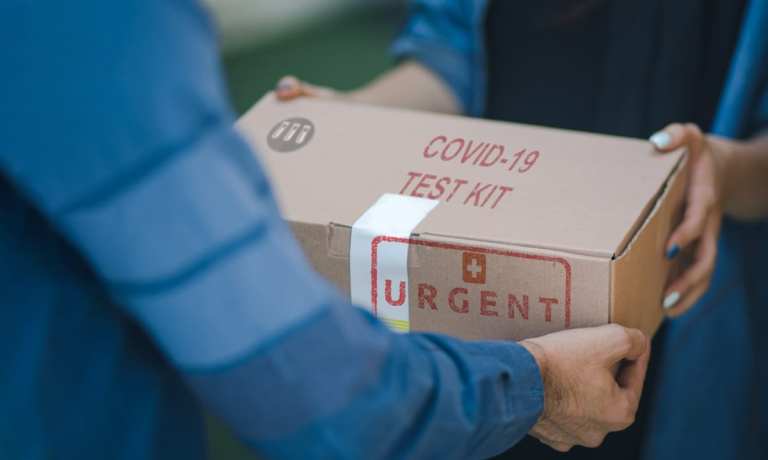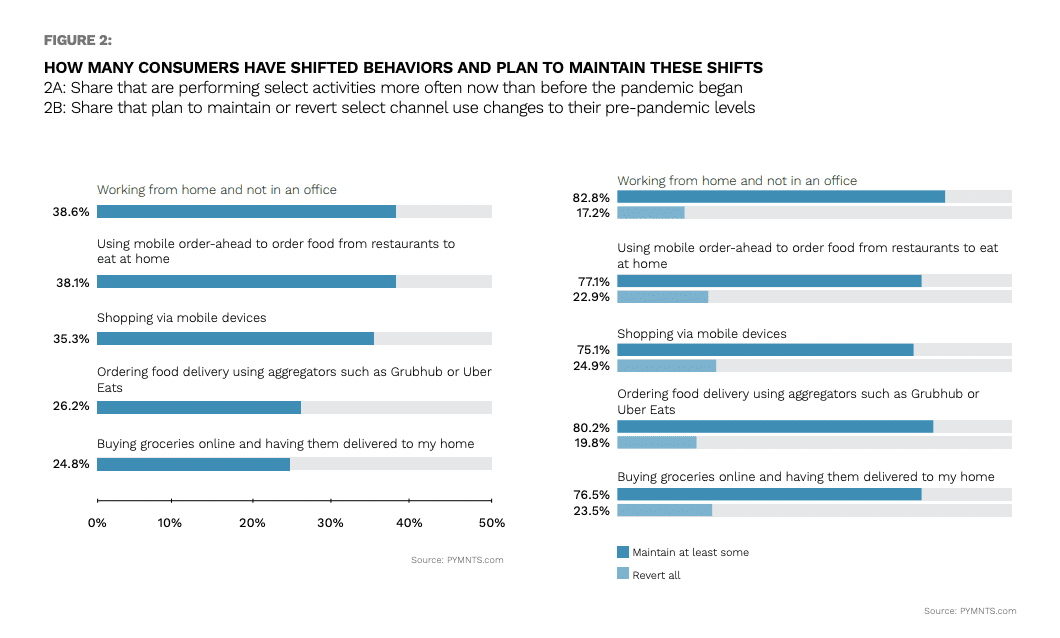DoorDash Delivers Covid Tests Amid Food Delivery’s ‘New Normal’

Over the last year, consumers have been well-trained to the idea that anything worth having can be ordered online and delivered to their door. Food, clothes, entertainment — name the object or activity, and there’s a firm(s) that will find a way to either deliver it digitally or drop it on a consumer’s doorstep.
In light of that development, it should come as no surprise that DoorDash has found something new to deliver to customers other than dinner. The firm announced that it has partnered with two U.S.-based digital health companies — Vault Health and Everlywell — to distribute at-home COVID-19 test kits. Consumers will be able to order test kits directly from DoorDash in 12 markets, or can order the kits from Vault Health’s website in an additional 20 markets with same-day delivery from DoorDash.
The Everlywell testing kit, which costs $109, is a self-administered nasal swab that can be done unsupervised; Vault Health’s kit costs $119 and is a saliva test that involves supervision from a staffer over Zoom. Both companies promise to return results within 24 to 48 hours.
Baltimore, Chicago, Cleveland, Dallas, Denver, Minneapolis and Phoenix will be among those states first starting the program, with more cities to be added soon, the company said. Baltimore, Houston, Las Vegas, Phoenix and San Diego are all open for ordering via Vault Health and delivery through DoorDash.
The move comes as DoorDash, Uber Eats and others in the food delivery space are coming off a very big year — and are trying to figure out how to leverage their newfound power into a post-pandemic future that is just as profitable.
According to recent PYMNTS data on the evolution of the digital consumer, 38 percent of all consumers have shifted from dining in restaurants to ordering food on their mobile phones for pickup, while 77 percent who have made the shift to using mobile order-ahead apps plan to keep doing so even after the pandemic has subsided.
 Meanwhile, the same data shows that 26 percent of consumers report using aggregators like Uber Eats, Grubhub and DoorDash more now than they did before the pandemic began. Eighty percent of them intend to keep using aggregators at least as often as they do now even after the pandemic has subsided. That’s a big increase from back in November of 2020, when only 72 percent planned to keep doing so after the pandemic had ended.
Meanwhile, the same data shows that 26 percent of consumers report using aggregators like Uber Eats, Grubhub and DoorDash more now than they did before the pandemic began. Eighty percent of them intend to keep using aggregators at least as often as they do now even after the pandemic has subsided. That’s a big increase from back in November of 2020, when only 72 percent planned to keep doing so after the pandemic had ended.
Consumers’ increasing demand for ordering via aggregators signals that apps will continue to play a prominent role in the post-pandemic restaurant industry. But PYMNTS data also shows that consumers hunger, pardon the pun, to spend time with friends and family again and to participate in activities, which means many will likely return to dining in restaurants as vaccine rollout expands and herd immunity starts to set in.
That ties in with DoorDash’s latest expansion, which comes in tandem with the firm’s DashMart convenience store platform, a virtual marketplace the company created last summer as an all-hours competitor in the convenience space. The stores also source from a variety of different vendors. The COVID-19 kits, according to DoorDash, represent the firm’s expansion into the world of health products.
“Amidst the pandemic, one of our priorities has been to make health and wellness essentials more accessible for customers, with the goal of helping businesses leverage our last-mile logistics infrastructure to provide more convenient and timely access to their health supplies,” Anna Katherine Barnett-Hart, director of new verticals at DoorDash, said in a statement.
The pandemic is coming to an end — albeit very slowly. According to PYMNTS’ latest consumer survey, the good news is that consumers are growing slightly more confident that a return to normal is coming sooner than they expected at the end of last year. The average U.S. consumer believes the pandemic would end in 289 days if vaccines were not available, and that widespread vaccinations will lead to the pandemic ending in 252 days — 37 days sooner than would otherwise be possible. The hope now is to re-enter the world in a more regular way by January 2022 instead of April.
The challenge for firms like DoorDash, which rode the wave of locked-down consumers last year, will be to figure out what to do as that wave crests this year and consumers start getting back out there. And it seems we are starting to see the answer shaping up, as firms are doing more to meet consumers as they engage in an increasing number of digital transactions.
Read More On Delivery:
- Domino’s Loyalty Refresh Doubles Members’ Pickup Orders Amid Consumer Hesitance
- Shop Talk: Grubhub’s Grocery VP Says ‘We’ll Catch Up Very Quickly’
- Aggregators Take on Vacation Season With Travel Offerings
- OCN Raises $86 Million to Expand Gig Worker Platform